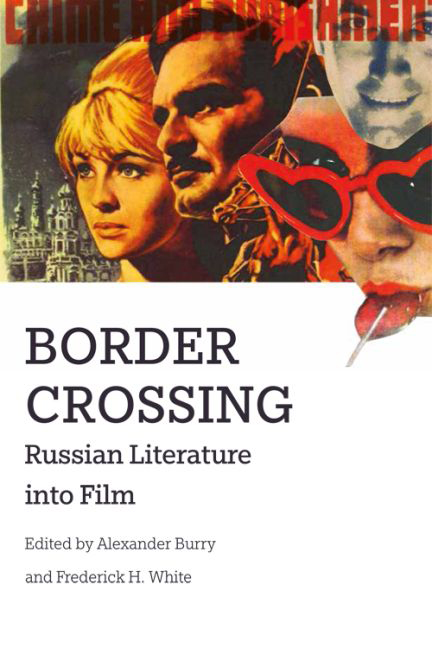Book contents
- Frontmatter
- Contents
- List of Figures
- Notes on the Contributors
- Introduction: Filming Russian Classics—Challenges and Opportunities
- 1 Across the Russian Border
- 2 Dostoevskii's “White Nights”: The Dreamer Goes Abroad
- 3 On Not Showing Dostoevskii's Work: Robert Bresson's Pickpocket
- 4 Stealing the Scene: Crime as Confession in Robert Bresson's Pickpocket
- 5 The Eye-deology of Trauma: Killing Anna Karenina Softly
- 6 “A Vicious Circle”: Karen Shakhnazarov's Ward no. 6
- 7 A Slap in the Face of American Taste: Transporting He Who Gets Slapped to American Audiences
- 8 Against Adaptation? The Strange Case of (Pod) Poruchik Kizhe
- 9 Chasing the Wealth: The Americanization of Il'f and Petrov's The Twelve Chairs
- 10 Fassbinder's Nabokov—From Text to Action: Repressed Homosexuality, Provocative Jewishness, and Anti-German Sentiment
- 11 “The Soviet Abroad (That We Lost)”: The Fate of Vasilii Aksenov's Cult Novel A Starry Ticket on Paper and on Screen
- Conclusion: Passport Control—Departing on a Cinematic Journey
- Bibliography
- Filmography
- Index
10 - Fassbinder's Nabokov—From Text to Action: Repressed Homosexuality, Provocative Jewishness, and Anti-German Sentiment
- Frontmatter
- Contents
- List of Figures
- Notes on the Contributors
- Introduction: Filming Russian Classics—Challenges and Opportunities
- 1 Across the Russian Border
- 2 Dostoevskii's “White Nights”: The Dreamer Goes Abroad
- 3 On Not Showing Dostoevskii's Work: Robert Bresson's Pickpocket
- 4 Stealing the Scene: Crime as Confession in Robert Bresson's Pickpocket
- 5 The Eye-deology of Trauma: Killing Anna Karenina Softly
- 6 “A Vicious Circle”: Karen Shakhnazarov's Ward no. 6
- 7 A Slap in the Face of American Taste: Transporting He Who Gets Slapped to American Audiences
- 8 Against Adaptation? The Strange Case of (Pod) Poruchik Kizhe
- 9 Chasing the Wealth: The Americanization of Il'f and Petrov's The Twelve Chairs
- 10 Fassbinder's Nabokov—From Text to Action: Repressed Homosexuality, Provocative Jewishness, and Anti-German Sentiment
- 11 “The Soviet Abroad (That We Lost)”: The Fate of Vasilii Aksenov's Cult Novel A Starry Ticket on Paper and on Screen
- Conclusion: Passport Control—Departing on a Cinematic Journey
- Bibliography
- Filmography
- Index
Summary
Rainer Werner Fassbinder's film Despair was shot in 1977 and was proudly premiered at the Cannes International Film Festival in 1978. The film is based on one of Vladimir Nabokov's major Russian novels, Despair. The eminent British playwright Tom Stoppard prepared the screenplay for Fassbinder, carefully adapting Nabokov's text for cinematic staging. The hypotext Despair was originally published in 1934 in Contemporary Letters, a major Russian–Parisian literary journal of the pre-war emigration, and further issued as a separate book in Berlin (by Petropolis) in 1936. The original storyline was set in Berlin at the beginning of the 1930s.
Fassbinder's Despair has enjoyed wide scholarly attention over the years. Of particular importance are the works of the British scholar Ewa Mazierska and the film historian Thomas Elsaesser. Most recently, the Russian critic Nina Savchenkova organized a special roundtable focused on the film's reception in Russia which was hosted by the Nabokov museum in St. Petersburg. The ontological discongruity between the two artists was one of the dominant themes of this roundtable. In what follows, I will analyze Fassbinder's hypertext along with Nabokov's hypotext in order to address the dramatic dialectical collision that occurs when Fassbinder transports Nabokov's hypotext to a different cultural territory—namely Nazi Germany. The main differences between these artistic sensibilities are related to two major spheres: “the territory of homosensuality,” as opposed to the heterosexual universe of Nabokov, and the “territory of nascent Nazism” as explored by Fassbinder, which is opposed to Nabokov's “neutral” German environs. The point is not to illustrate the affinity between the two artists, but rather to highlight the personal and aesthetical differences that emerge with this border crossing.
WRITTEN AND CINEMATIC TEXTS
Before we start the discussion, it is important to account for all of the available versions of the author's text (the Russian hypotext and then Nabokov's own modified English translation and the English script-adaptation of the film by Stoppard—both hypertexts of the original).
- Type
- Chapter
- Information
- Border CrossingRussian Literature into Film, pp. 202 - 222Publisher: Edinburgh University PressPrint publication year: 2016



